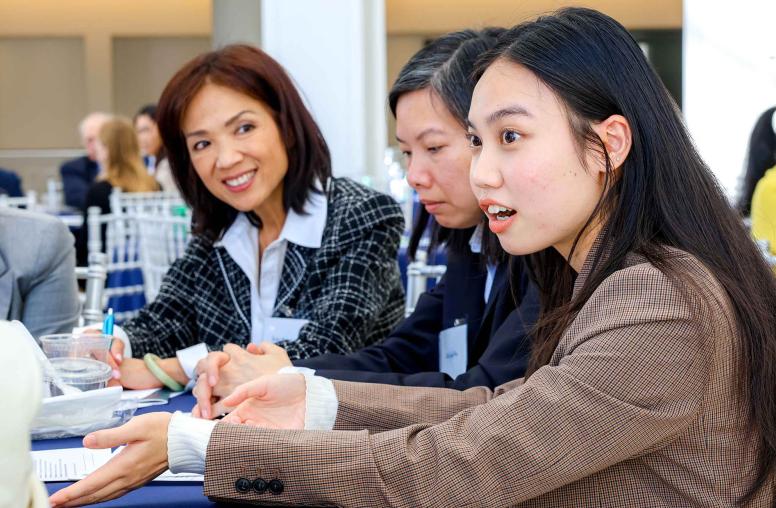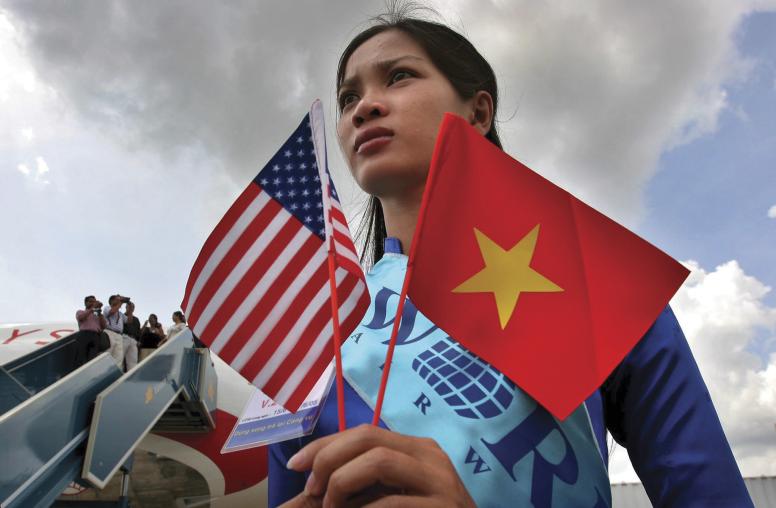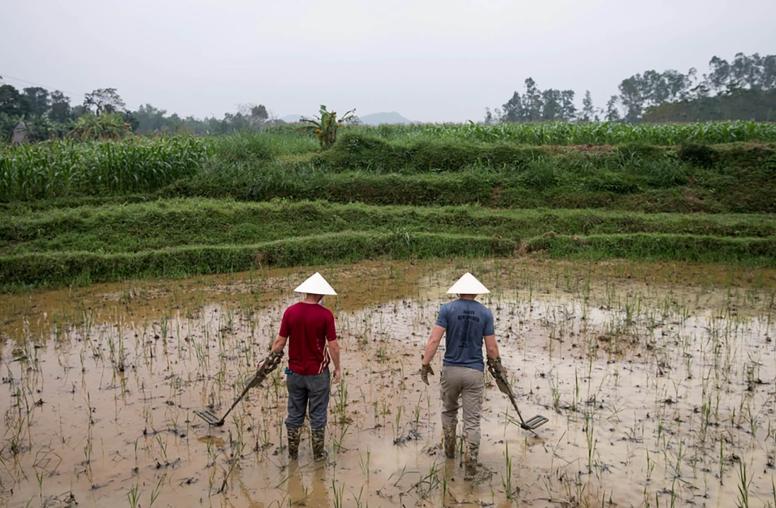Andrew Wells-Dang on U.S.-Vietnam Relations 48 Years After the War
While U.S.-Vietnam relations have progressed remarkably since the end of the Vietnam War, “we talk about reconciliation as a long-term process … so even though we’re now almost 50 years into the post-war period, that reconciliation process isn’t complete yet,” says USIP’s Andrew Wells-Dang.
U.S. Institute of Peace experts discuss the latest foreign policy issues from around the world in On Peace, a brief weekly collaboration with SiriusXM's POTUS Channel 124.
Transcript
Laura Coates: We're joined now by Andrew Wells-Dang, a senior expert of Southeast Asia at the United States Institute of Peace. His primary responsibility centers around the USIP's Vietnam War legacies and reconciliation initiative. He joins us now, he spent two weeks in Vietnam back I think, in April and was there when Blinken visited Hanoi as well. Welcome and good morning, Andrew, how are you?
Andrew Wells-Dang: Good morning, Laura. Glad to be here.
Laura Coates: Glad that you're joining us here today. Although you know, we talk a lot about this date in the history of May 1, yesterday, marked a very consequential anniversary, the 48th anniversary of the end of the war in Vietnam and the fall of Saigon. Tell me about the significance of this anniversary and our relations with Vietnam since now.
Andrew Wells-Dang: Yeah, so it's coming up on 50 years, right since the end of the war. And actually, over the last few months, we marked the 50th anniversary of the Paris Peace Accords, which led to the withdrawal of U.S. troops, and the return of U.S. prisoners. So, the last U.S. forces left Vietnam in late March. Two years after that the war ended right. So, I think Americans are familiar with that story. What's happened in Vietnam since then, is quite surprising. There were about 20 years where the U.S. and Vietnam didn't have relations and continued to be opponents. But then starting in the 90s so, lifting a trade embargo, and having normal relations starting in 1995, the U.S. and Vietnam's relationship have gotten much closer. And that's true between governments and also among people, including Vietnamese in the U.S., who are going back to Vietnam much more.
Laura Coates: So, there has been now an invitation, as I understand it for the General Secretary Trong of Vietnam to come to Washington, in just a few months to meet with President Biden. It's not been confirmed yet, I don't believe, but there would be a lot of things to talk about in the U.S.-Vietnam relations post war, what do you think would be the key conversations to have?
Andrew Wells-Dang: Yeah, that's right. So, there was a phone call between President Biden and General Secretary Trong, a little over a month ago and Secretary Blinken's visit, followed that up and made this invitation for a state visit. This wouldn't be the first time right there have been visits previously in the Obama and Trump administrations in which, essentially, the U.S. and Vietnam leaders say, we know we have differences, we agree to respect those differences and here are all these things we want to work together on. And those things include cleaning up war legacies like Agent Orange, having security cooperation, like on keeping the South China Sea open, having more economic ties, educational exchange, health cooperation, and climate change is increasingly an important part. So, I expect that if this visit happens in the summer, that the President and General Secretary will talk about these things and see, are there opportunities to increase their relationship, possibly increasing the current what's called a comprehensive partnership, to a strategic partnership. Now, what that means is still being discussed, right. But the U.S. would like to see that kind of upgrade. I think on the Vietnamese side, they also want better relations with the U.S. but in a way that doesn't upset China or lead to a perception that they're shifting their policy in some way. They want to keep on a stable level.
Laura Coates: You know, there's this phrase, and I know you have referenced it around reconciliation, and it has different meanings in different contexts. Obviously, when we're talking about U.S.-Vietnam relations, what is meant by reconciliation?
Andrew Wells-Dang: Right, so I work at a peacebuilding institute, right, the U.S. Institute of Peace, we talk about reconciliation as a long-term process after the end of a war. And so, part of that is the diplomatic normalization. But then there's a lot more than that, right. There's about people in both countries understanding and accepting the past, developing relationships with each other, and then having a shared vision of the future and that takes a lot of time. So, even though we're now almost 50 years in the post war period, that reconciliation process isn't complete yet. It's been driven by ordinary citizens. So, like U.S. veterans and Vietnamese veterans, people working for nonprofits, peace activists, businesspeople. And the role of Vietnamese Americans is especially important, right, because they have links to both countries. Many of them came from the former South Vietnam, which was defeated and then they emigrated to the U.S. That reconciliation among Vietnamese is perhaps the hardest part and that will take more time.
Laura Coates: Well, you know, there's also the public sentiment and a lot of the conversations on the legacies of the Vietnam War, like missing personnel, Agent Orange, for example, there used to be very major obstacles between the two countries. Where do things stand, and as the way you see it in terms of those initial and very major hurdles between diplomatic relations.
Andrew Wells-Dang: Right, so the first one that we dealt with was cooperation to find missing Americans and that's been going since the mid-1980s. And it's been the basis for a lot of the cooperation that's happened since. After normal relations so, in the 90s, the U.S. started to support cleaning up landmines and unexploded bombs. Agent Orange was a harder one, because it's such a complicated issue, but starting around the mid-2000s, the U.S. and Vietnam started to work together on cleaning up hotspots. So, like contaminated military bases, and helping people that are affected by Agent Orange or believed to be. And now just in the last few years, the piece of helping Vietnam look for missing people from the war has started and USIP is part of that initiative from the U.S. government side. It's a massive question, there are hundreds of thousands of Vietnamese still missing or unidentified from the war and time is running out. So, the time to work on these tasks is now and the 50th anniversary that we're talking about is a way to show attention and build support for it.
Laura Coates: Why hasn't the date been set?
Andrew Wells-Dang: The date for which?
Laura Coates: For this meeting.
Andrew Wells-Dang: As far as I know, the U.S. has made the invitation and it's simply being worked out when it's possible to hold it. There also are questions about the health of the general secretary from Vietnam, who is almost as old as the U.S. president, and hasn't traveled anywhere as far away as the U.S. for many years. So, we can keep our fingers crossed that the visit might happen. There's also an invitation in return for President Biden to go to Vietnam later this year and we don't know whether that will happen or not either.
Laura Coates: Age seems to be the additional candidate in all of these races. Thank you for stopping by today. Andrew Wells-Dang, I appreciate it so much. Have a great rest of your day.
Andrew Wells-Dang: Thanks so much, Laura. Take care.



